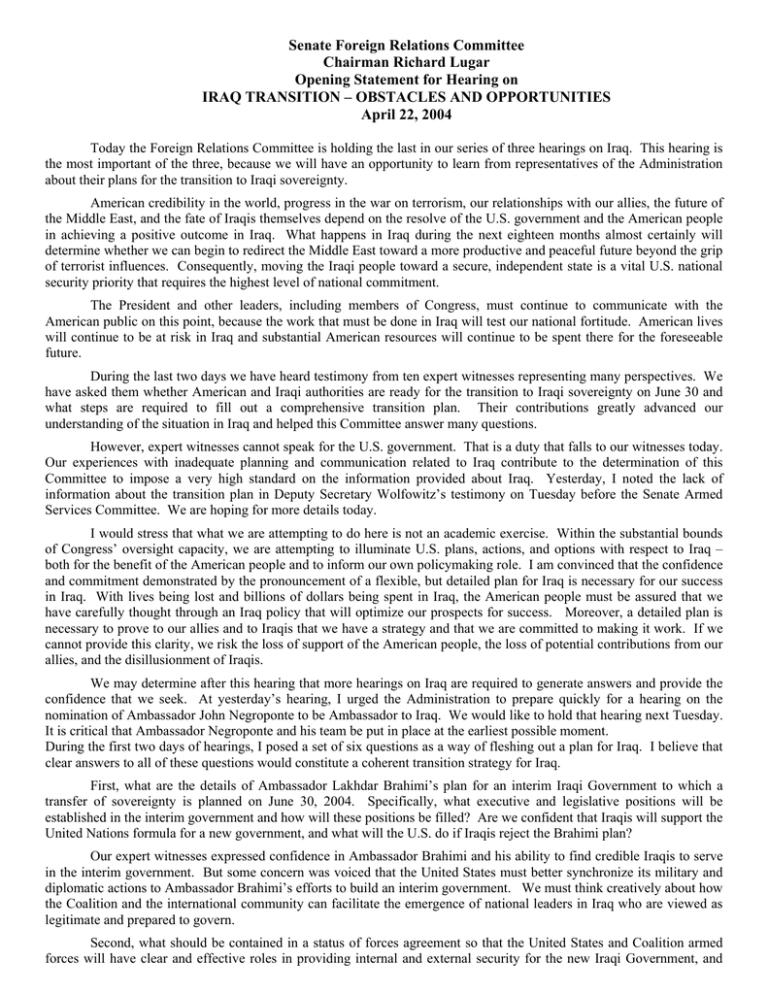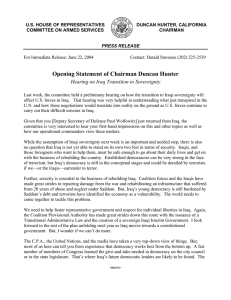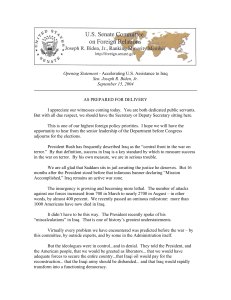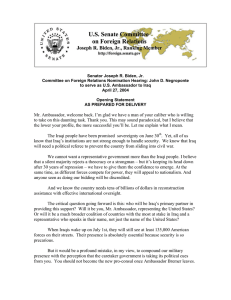Senate Foreign Relations Committee Chairman Richard Lugar Opening Statement for Hearing on
advertisement

Senate Foreign Relations Committee Chairman Richard Lugar Opening Statement for Hearing on IRAQ TRANSITION – OBSTACLES AND OPPORTUNITIES April 22, 2004 Today the Foreign Relations Committee is holding the last in our series of three hearings on Iraq. This hearing is the most important of the three, because we will have an opportunity to learn from representatives of the Administration about their plans for the transition to Iraqi sovereignty. American credibility in the world, progress in the war on terrorism, our relationships with our allies, the future of the Middle East, and the fate of Iraqis themselves depend on the resolve of the U.S. government and the American people in achieving a positive outcome in Iraq. What happens in Iraq during the next eighteen months almost certainly will determine whether we can begin to redirect the Middle East toward a more productive and peaceful future beyond the grip of terrorist influences. Consequently, moving the Iraqi people toward a secure, independent state is a vital U.S. national security priority that requires the highest level of national commitment. The President and other leaders, including members of Congress, must continue to communicate with the American public on this point, because the work that must be done in Iraq will test our national fortitude. American lives will continue to be at risk in Iraq and substantial American resources will continue to be spent there for the foreseeable future. During the last two days we have heard testimony from ten expert witnesses representing many perspectives. We have asked them whether American and Iraqi authorities are ready for the transition to Iraqi sovereignty on June 30 and what steps are required to fill out a comprehensive transition plan. Their contributions greatly advanced our understanding of the situation in Iraq and helped this Committee answer many questions. However, expert witnesses cannot speak for the U.S. government. That is a duty that falls to our witnesses today. Our experiences with inadequate planning and communication related to Iraq contribute to the determination of this Committee to impose a very high standard on the information provided about Iraq. Yesterday, I noted the lack of information about the transition plan in Deputy Secretary Wolfowitz’s testimony on Tuesday before the Senate Armed Services Committee. We are hoping for more details today. I would stress that what we are attempting to do here is not an academic exercise. Within the substantial bounds of Congress’ oversight capacity, we are attempting to illuminate U.S. plans, actions, and options with respect to Iraq – both for the benefit of the American people and to inform our own policymaking role. I am convinced that the confidence and commitment demonstrated by the pronouncement of a flexible, but detailed plan for Iraq is necessary for our success in Iraq. With lives being lost and billions of dollars being spent in Iraq, the American people must be assured that we have carefully thought through an Iraq policy that will optimize our prospects for success. Moreover, a detailed plan is necessary to prove to our allies and to Iraqis that we have a strategy and that we are committed to making it work. If we cannot provide this clarity, we risk the loss of support of the American people, the loss of potential contributions from our allies, and the disillusionment of Iraqis. We may determine after this hearing that more hearings on Iraq are required to generate answers and provide the confidence that we seek. At yesterday’s hearing, I urged the Administration to prepare quickly for a hearing on the nomination of Ambassador John Negroponte to be Ambassador to Iraq. We would like to hold that hearing next Tuesday. It is critical that Ambassador Negroponte and his team be put in place at the earliest possible moment. During the first two days of hearings, I posed a set of six questions as a way of fleshing out a plan for Iraq. I believe that clear answers to all of these questions would constitute a coherent transition strategy for Iraq. First, what are the details of Ambassador Lakhdar Brahimi’s plan for an interim Iraqi Government to which a transfer of sovereignty is planned on June 30, 2004. Specifically, what executive and legislative positions will be established in the interim government and how will these positions be filled? Are we confident that Iraqis will support the United Nations formula for a new government, and what will the U.S. do if Iraqis reject the Brahimi plan? Our expert witnesses expressed confidence in Ambassador Brahimi and his ability to find credible Iraqis to serve in the interim government. But some concern was voiced that the United States must better synchronize its military and diplomatic actions to Ambassador Brahimi’s efforts to build an interim government. We must think creatively about how the Coalition and the international community can facilitate the emergence of national leaders in Iraq who are viewed as legitimate and prepared to govern. Second, what should be contained in a status of forces agreement so that the United States and Coalition armed forces will have clear and effective roles in providing internal and external security for the new Iraqi Government, and will that agreement make clear the chain or chains of command and the relationship of Iraqi police, reserves, and army personnel with U.S. and coalition forces? All of our expert witnesses agreed that achieving security was the key to success in Iraq. They underscored that we have to determine who our partner is in the status of forces agreement. They also generally believed that the current level of U.S. forces could not achieve the degree of security that is necessary for a successful political outcome. In the short run, this may require more U.S. forces and more patrols that secure streets and neighborhoods. It will also require us to find other sources of competent troops from willing nations. Our ability to find these troops will depend on our flexibility in including the U.N. in decision-making and the ability of our own troops to diminish violence in the short run. We heard many views on how to establish and improve Iraqi security forces, but generally our experts believed that an effective Iraqi army and police force would require much more time, equipment, and resources than we have thus far dedicated to bringing these units to fruition. Third, will United Nations Security Council resolutions undergird the international legitimacy of the new Iraqi government and all of the security arrangements that it will require? How will the United States pursue such resolutions and what will they contain? Our experts stressed that U.N. involvement is necessary if we are to generate greater international participation, improve the political legitimacy of the interim Iraqi government, and take the American face off of the occupation of Iraq. They also underscored that we know how to operate under the auspices of U.N. Security Council Resolutions, and we can do so without sacrificing command of our troops or the intent of our mission. Fourth, will elections for the Transitional and Permanent Iraqi governments – scheduled for January 2005 and December 2005, respectively -- be held under the auspices of the United Nations or under some other authority? How will that authority provide security for the elections and assemble a registration list or otherwise determine who is eligible to vote? How will we deal with elections that are postponed or deemed to be fraudulent? Will the National Assembly that is to be elected in January 2005 have full authority to write a constitution and construct the framework of a permanent government? Our experts spoke to the importance of going forward with elections in Iraq, even if security and registration procedures are imperfect. They noted that elections would force Iraqi factions to enunciate policy choices and would stimulate dialogue between potential leaders and the Iraqi populace. In the absence of elections, factions will continue to bid for influence through violence, cronyism, or anti-American demonstrations. Fifth, beyond Ambassador Negroponte, what will be the composition of the U.S. embassy in Baghdad, and what is the schedule for the arrival of all embassy personnel? Given security concerns, our witnesses noted that some system must be worked out to allow embassy personnel to travel throughout Iraq. They emphasized that we should attempt to get as many personnel as possible in place before June 30. Sixth, will the costs associated with the new diplomatic presence be covered by a transfer of funds under the umbrella of the $87 billion appropriation enacted by the Congress last year? If not, what is the plan for providing the necessary funding? There was general consensus that some transfer of sovereignty will occur on June 30th, but that U.S. forces would be required to provide security in Iraq for at least several more years. We should develop cost estimates that assume an extensive U.S. involvement. Another important point generated by yesterday’s hearing was that the interim Iraqi government will require funding as well. What part of oil revenues or the $18 billion appropriated for reconstruction will be controlled by the interim government? The Foreign Relations Committee will be persistent in asking these questions and many others because Americans should have the opportunity to understand the Bush Administration’s plan and carefully monitor its progress. We welcome today Mr. Marc Grossman, Under Secretary of State for Political Affairs; Mr. Peter Rodman, Assistant Secretary of Defense for International Security Affairs; Mr. Andrew Natsios, Administrator of the U.S. Agency for International Development; Mr. Frank Ricciardone, Jr., our Ambassador to the Republic of the Philippines and State Department Coordinator for the Iraq Transition; and Lieutenant General Claude Kicklighter, the Transition Chief for the Coalition Provisional Authority. We thank each of our witnesses for joining us, and we look forward to the details and insights that they will provide. ###





